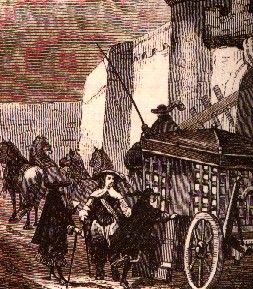 |
| Fouquet |
While Louis himself undoubtedly had his own suspicions regarding Fouquet, there were plenty of courtiers willing to add their voices to choir. Colbert was quite likely one of them.
One would think that a man with Fouquet's intelligence would suspect that something was amiss but rather than stepping back Fouquet upped his game. After being turned down as head of government, Fouquet decided that he might as well show that he was still a man to be reckoned with. First, it should be said that Fouquet was a man of immense wealth. One of the things he did that definitely brought attention to him was to buy the port of Belle-Île-en-Mer. That would in itself not be considered odd if it had not been for the fact that he fortified the port. This gave him literally a save harbour in case the King turned against him.
Secondly, he turned to his estate of Vaux-le-Vicomte. He lavished funds on his home and brought in hitherto rather unknown artists such as Louis le Vau and Charles le Brun. For his gardens he hired André le Nôtre. Their combined effort transformed Vaux-le-Vicomte into the most splendid château of its' day.
Fouquet's fate was sealed in August 1661 (although it is very likely that his demise was already happening) when the court and Louis XIV was invited to the newly-finished Vaux-le-Vicomte. There, Fouquet gave a show of such lavish entertainment (complete with fireworks) that would be remembered as one of the finest celebrations in 17th century France. But Louis XIV was far from pleased. The young King was furious at being outdone in the art of magnificence and the awe of his courtiers only furthered the King's wrath.
 |
| Arrest of Fouquet |
The first move was to trick Fouquet into selling his office as procurer général (the head of the tax collectors, among others) which efficiently removed the protection Fouquet had so far had. Then the King announced that he would visit Nantes and when the King went somewhere, so did his councillors. Upon leaving the council room, Fouquet was arrested by the infamous d'Artagnan and taken away on 5 September.
There was to be a trial if the case should even hope to be accepted by the public. But had the public known how that trial was carried out much might have been different. In total, the trial dragged out for three years and during it there was no legal course that could not be overturned. The courtiers were shocked to learn how far Louis XIV was willing to go to assure Fouquet's downfall and some even dared to speak out. Colbert tried to prevent case acts from reaching the public but it had little effect since they were printed in the Netherlands after all. It had no effect.
 |
| The trial |
No doubt the King had wished for Fouquet to be sentenced to death but instead he was banished. Louis XIV was utterly disappointed and changed the sentence to imprisonment for life. In December 1664 Fouquet was transferred to the fortress of Pignerol. It was said that his cell bordered on that of the Man in the Iron Mask.
Fouquet remained in Pignerol until his death which was reported in 1680.


There is a book about this case. It was published shortly after you posted this item.
ReplyDeleteEmbezzlement and High Treason in Louis XIV's France: The Trial of Nicolas Fouquet by Vincent J. Pitts (2015)
I am reading Mme de Sévigné's interesting eye-witness account of the trial of Fouquet (to whom she was sympathetic).
ReplyDelete